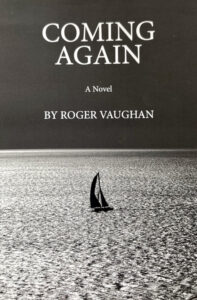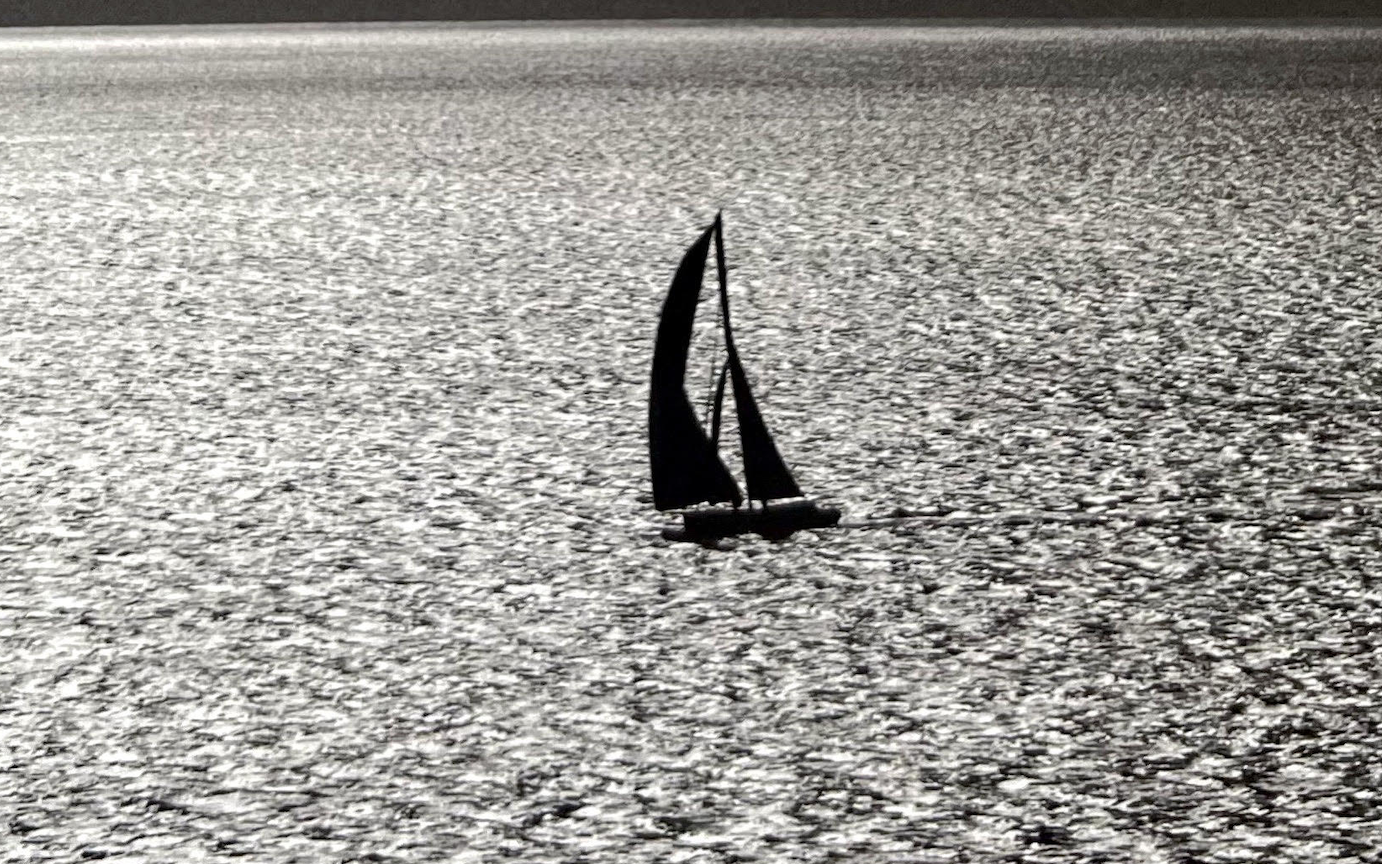Long-time Talbot County resident and sailor Roger Vaughan loves to write. It’s tempting to say he writes first, then breathes.
A professional biographer, columnist, feature writer and novelist, his credit list is long and diverse, heavy on competitive sports and the arts. Conductor Herbert von Karajan, professional hockey, Ted Turner, golf, baseball’s Tony Gwynne are all among his many subjects.
At the top of the impressive heap though is sailing – professional and competitive sailing.
 Deft and experienced, Vaughan brings all of his deep breadth and craft into play in his most recent novel, Coming Again. Sequel to Coming About, his first novel, Coming Again offers another enjoyable and intriguing read centered in an around-the-world sailing race. The two books first appeared in monthly serial form over the past couple of years in the Tidewater Times, a regional publication. They are now available as full-length books in print or electronic format through Amazon.
Deft and experienced, Vaughan brings all of his deep breadth and craft into play in his most recent novel, Coming Again. Sequel to Coming About, his first novel, Coming Again offers another enjoyable and intriguing read centered in an around-the-world sailing race. The two books first appeared in monthly serial form over the past couple of years in the Tidewater Times, a regional publication. They are now available as full-length books in print or electronic format through Amazon.
A quick synopsis of Coming About sets the stage for Coming Again:
“Andy Moss, a wealthy, spoiled young man with too much alcohol under his belt, commits a social gaff at a New York Yacht Club dinner that makes it impossible for his father not to enter a boat in The Round the World Race. Furious, the father forces his son to participate as a crewman in the arduous, 30,000 mile event. Faced with spending nine months at sea imprisoned in the spartan confines of a 60-foot race boat with eleven strangers, Andy desperately struggles to unravel the mysteries that surround his family; mysteries that have haunted his own life. First, he has to survive the Roaring 40s – the untamed Southern Ocean – and the threat that awaits him on board.”
Those mysteries revealed, Coming Again picks up where the first book leaves off: the round-the world race still underway and the redeemable Andy still center stage. Always searching for cleaner air to win races real and metaphorical, weaving his way through beatings and betrayals, navigating the full spectrum of good and evil, Andy aims for a triumphant conclusion through all of the twists and turns concocted for him by the author.
Vaughan shows off his sailing chops in Coming Again’s Chapter 8, The Tasman. He rolls out a rollicking ride of exciting and occasional technical bluewater sailing writing. The juice comes strong.
The novel’s main man is steering All American on a 1,200 mile leg between Sydney in Australia and Auckland in New Zealand, racing for a first-place finish in this and future legs against Ram Bunctious, another entry in the race.
“For Andy, once into the rhythm of it, the pleasure, the satisfaction, was immense. It was like steering a high performance dinghy, a 470, or a Melges, only frighteningly more impressive when All American planed down a wave and all sixty feet of it was so in tune with wind and water that it felt suspended in time and space – steady as a rock, locked into a slender groove – with the speedo climbing to twenty-three, twenty-five, twenty-seven; with helm, boat and sails seeming frozen for as much as five or eight seconds (a forever moment), pushing through the reality of that tenuous envelope of performance the designer had glimpsed in his dreams.”
The author mixes into the salty recipe the tension of matching physical and mental wits against the careless power of unpredictable weather. A smuggling backstory, involving millions of dollars worth of precious gems secreted aboard All American, spices the narrative with a shroud of extra tension sustaining the reader’s urge to keep on turning the pages to the book’s finish. And, while walking out a diverse cast of characters from the sexy and vengeful Isha and her pot-smoking, sidekick vixen Jodi, to two corrupt father figures and a former New York Jets linebacker grinding All American’s winches, Vaughan also finds calm moments to contrast it all with philosophy and environmental concern.
In a chapter about leaving the Pacific and rounding the dangerous Cape Horn at the southern tip of South America into the unpredictable southern Atlantic, All American crew members reflect on their narrow escape from an encounter that could have spelled the demise of all.
“What could have been – the boat holed and sinking quickly beneath their feet, serious injuries, the mast coming down and many days in a life raft if the thing even inflated – chilled their dreams. Once they have put their lives in Mother Nature’s hands, ocean sailors are superstitious creatures. Collectively the crew kept wondering why they had been spared. … Stu Samuels had put it best. ‘Mother Nature simply isn’t that friendly,’ he said, ‘or that empathetic with us humans who are savaging her planet with carbon dioxide …. Seriously you have to ask why. You do. We’re not a bunch of choir boys. We’re freaking sailors. We live selfish lives driven by the desire to be at sea. We’re like those Joseph Conrad sailors who get in trouble when they’re ashore for more than a couple of days. Unless we’re jibing the chute or trimming the backstay we’re basically irresponsible wayfarers who drink too much and shirk normal responsibilities. Why’d she save our sorry asses?’”
Add contemporary questioning to the author’s satisfying literary blend.
Coming Again and its predecessor, both good reads, carry their audience effortlessly to the finish. The only remaining question is where will the author focus his attention next.
Dennis Forney has been a publisher, journalist and columnist on the Delmarva Peninsula since 1972. He writes from his home on Grace Creek in Bozman.



Write a Letter to the Editor on this Article
We encourage readers to offer their point of view on this article by submitting the following form. Editing is sometimes necessary and is done at the discretion of the editorial staff.